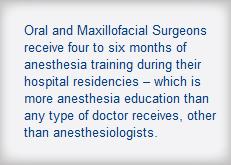 One of the traits that sets oral and maxillofacial surgeons apart from their dental partners is their extensive training and experience in pain prevention and elimination of anxiety. Whether local, intravenous sedation or general anesthesia is recommended for your procedure, be assured your doctor is proficient in evaluating patients for anesthesia, delivering the anesthetic and monitoring those who receive it. Each Northwest Oral & Facial Surgeon completed at least four years of training in a hospital-based surgical residency program with medical residents in anesthesia, general surgery and other specialties. Part of every Oral and Maxillofacial Surgeon’s hospital residency includes four to six months of anesthesia training. This is more anesthesia education than any type of doctor receives, with the exception of anesthesiologists.
One of the traits that sets oral and maxillofacial surgeons apart from their dental partners is their extensive training and experience in pain prevention and elimination of anxiety. Whether local, intravenous sedation or general anesthesia is recommended for your procedure, be assured your doctor is proficient in evaluating patients for anesthesia, delivering the anesthetic and monitoring those who receive it. Each Northwest Oral & Facial Surgeon completed at least four years of training in a hospital-based surgical residency program with medical residents in anesthesia, general surgery and other specialties. Part of every Oral and Maxillofacial Surgeon’s hospital residency includes four to six months of anesthesia training. This is more anesthesia education than any type of doctor receives, with the exception of anesthesiologists.
Why it may be needed
 To control pain and anxiety, patients may receive local anesthesia, nitrous oxide, intravenous sedation or general anesthesia. Together, you and your doctor will discuss the specific anesthetic recommended for your procedure and your preferences.
To control pain and anxiety, patients may receive local anesthesia, nitrous oxide, intravenous sedation or general anesthesia. Together, you and your doctor will discuss the specific anesthetic recommended for your procedure and your preferences.
- Topical anesthetics are usually gels that are placed on certain areas to numb them. We use topical anesthetics to prepare areas of the mouth to receive injections.
- Local anesthetics are injections given in a specific area where surgery will take place.
- Intravenous sedation anesthetics are administered through an IV and are used to achieve an anesthetic state where patients are responsive, yet unaware of the surgery. A majority of individuals have no recall of a surgery done while sedated.
- General anesthesia is administered through an IV and often in conjunction with inhalation anesthetic gases. The patient is completely unconscious and will not feel or remember the surgery.
What to expect before, during and after surgery
Local anesthesia involves an injection near the surgical site, which we numb beforehand with a topical numbing agent to make you as comfortable as possible. Nitrous oxide gas is administered with a small mask that we place over your nose to relax you. If your procedure calls for intravenous sedation or general anesthesia, you’ll receive an injection in your arm for an IV and may feel groggy or a little “out of it” after your surgery is complete. This feeling wears off within a few hours, but in the meantime it’s necessary for you to have someone drive you home. Your doctor may prescribe a medication to minimize any temporary post-surgical discomfort. For further information, refer to our pre- and post-surgery instructions.
Expert anesthesia administration
Your Northwest Oral & Facial Surgeon is fully responsible for all anesthesia administered in our practice. All of our doctors have received the following accreditations.
- Board Certification from the American Board of Oral and Maxillofacial Surgeons. Board Certification requires extensive specialty training and preparation, as well as completion of an initial written and oral exam. A recertification exam is required every 10 years. Because this certification is not mandatory to practice Oral and Maxillofacial Surgery, it is one of many factors that demonstrates our commitment to providing patients with the highest quality of care through excellent proficiency and knowledge of the specialty.
- Anesthesia License from the State of Ohio. This is a state certification which our doctors received after they displayed their proficiency in anesthesia during an in-office evaluation, which is repeated every five years. The training for this certification came from their residency program, and this license also requires Advanced Cardiac Life Support Certification.
Rest assured, extreme safety precautions are taken
During any procedure that involves anesthesia, all critical life systems are monitored electronically through the use of standard hospital operating room equipment. These measurements include blood pressure, heart rate and rhythm, and lung function. In our office, we keep the same emergency equipment used in hospitals available at all times. This includes crash carts, defibrillators and required emergency medications. Because our doctors have received extensive training in their specialty, anesthesia and emergency procedures, they are very capable of quickly identifying and treating a critical situation. In fact, our doctors have each received Advanced Cardiac Life Support Certification and are re-certified every two years.